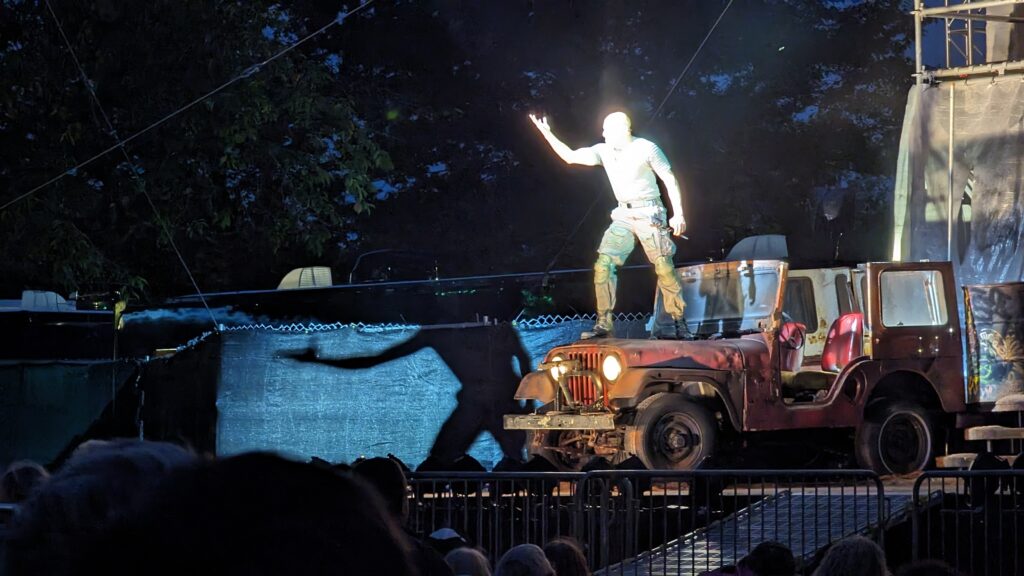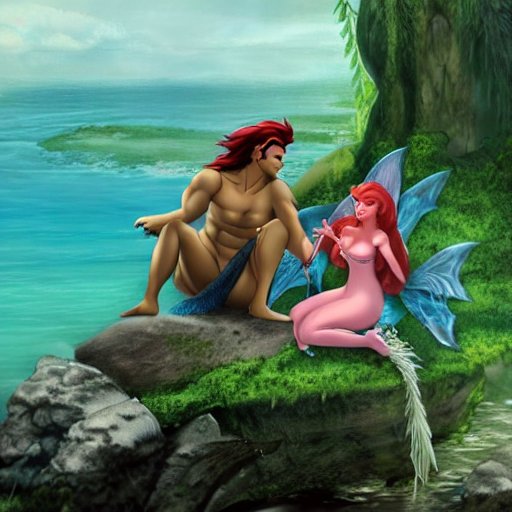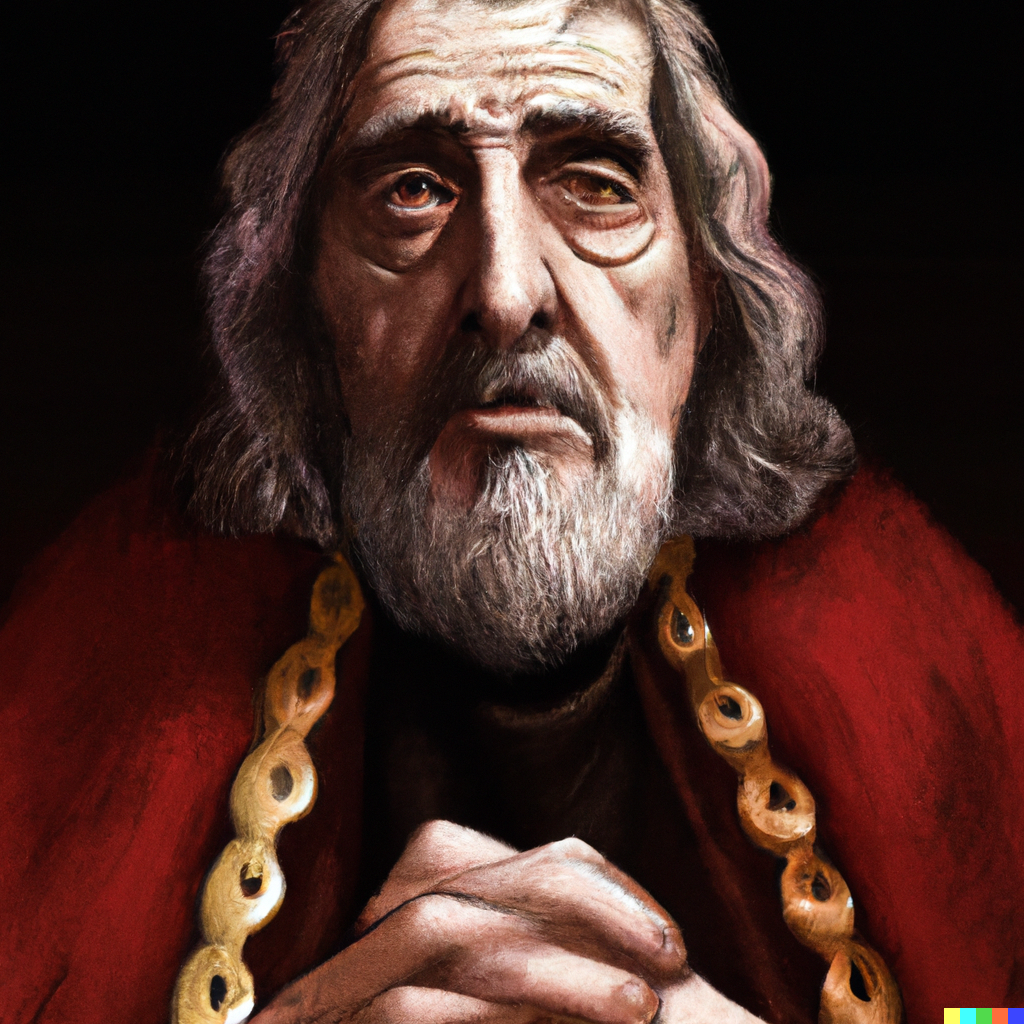I’ve been attending Commonwealth Shakespeare’s annual free production on Boston Common for longer than I can remember. I think my first show was their previous Macbeth in 2003, where we went with friends and only saw part of it in a right place, right time, “Oh, they’re doing Shakespeare? Let’s watch!” situation. Since then, I missed 2005 (Hamlet, a long story) and 2019 (Cymbeline, my mom was sick). So I’ve seen … 17 of their shows. Only Macbeth and Much Ado have repeated on my watch. The great thing about going now is that my kids are old enough to come with us, and have been to several shows now. So it’s a family affair! We rent our chairs; we get our spot, and we bring a Chinese takeout picnic. Gotta love traditions.

When I saw the burned-out jeep, I posted wondering whether we were going to get a dystopian Macbeth. That’s kind of like the generic interpretation, don’t you think? I feel like dystopian Macbeth is clichè. “Watch,” I told the kids, “everybody will be dressed in military uniforms and camouflage.”




So, there’s that. 🙂 In fairness, Macbeth gets to change his clothes, but nobody else does. Where’s the camo, though, you ask? Let’s talk witches. The witches weren’t just in camouflage, but a bright yellow, almost glow-in-the-dark version. Once you accepted that you weren’t going to see anything “witchy” and thought of them more as the possessed souls of fallen soldiers, the effect worked.
I’m paying particular attention to the costumes because I want to highlight Lady Macbeth’s. She got all the good stuff, and it was so worth it:




I was asked on Twitter how they made use of the set. I wish the jeep had moved, but it did not. The lights worked, as we see with the witches. People climbed all over it. This did give us opportunities for a cool shot like this during the dagger speech:

I still can’t figure out if there’s something special going on there. The angle of his real arm doesn’t match the angle of the shadow. That’s one of those “If I went back to see it again I’d pay closer attention” moments.

They did a great job with lighting and smoke. This is Macbeth going to visit the witches. Later, the stage will be full of the ghosts of kings. And yes, unfortunately, that monitor was right in our way the whole time. That’s my biggest complaint about the show. In recent years they’ve leaned heavily into accessibility, which is great (a year or two ago, they had sign language interpreters, which was really cool). But that’s a horrible spot, and you’re literally saying, “We’re going to lower the quality of the experience for the majority of the audience who don’t need this feature.”
Yes, but how was the show?
Enough pictures; let’s talk about acting. Over the years, it’s become my role to be the Shakespeare explainer guy. Whoever I’m with, whether it’s my family, coworkers, or friends, typically doesn’t know the story’s intricacies. So I’m called upon to, and I’m going to say this like this for a reason, keep it interesting. Anybody can read the synopsis in the program, and I could laundry list what’s about to happen. What I try to do instead, therefore, is to find the “watch for this” moments that they can hang on. They’re going to lose track of who’s who, and they’re going to misunderstand most of the lines. So if I can find some moments of human experience that (a) they won’t miss and (b) they’re sure to understand, then they have something to work with.
What I said this year was, “Watch Macduff. Here’s the thing with Macduff. Macbeth’s technically got no beef with him, he’s not Duncan’s family and he’s not in line for the throne. But he doesn’t go to Macbeth’s coronation, and Macbeth takes that personally. So there’s going to be a scene where Macduff’s wife and children are murdered. I don’t know how they’re going to play it here, but it’s a bad scene, it’s legit horror if they want to go that way. And then there’s this poor messenger that has to tell Macduff what’s happened, and Macduff loses it. Done right, it’s heart-wrenching. He’s so excited to get news from his family that the messenger at first tells him everything’s fine, but then has to break it to him, and the way he just keeps asking, all of them? all? can tear your heart out. So Malcolm convinces Macduff to join his army, and ultimately he’s the one to be the hero, get his revenge and kill Macbeth to end they play.”
They – more specifically, Macduff – did not disappoint. The actual murder did, That scene was played out almost like an interpretive dance, and I found it too safe. Make it obvious; make it bloody. The wife’s pregnant, and I can’t remember if that’s always how it is played. But if you show the murder of a pregnant woman, you’ll get the audience to pay attention.
But Macduff just crushed it. The Shakespearean actor playing Macduff is immediately gone, and the man whose family has been murdered (because he wasn’t there to protect them!) is before us. When I described the scene as I did, he gave me exactly what I hoped it would be. You felt what he was feeling. His revenge would mean something.
Points also to Lady Macbeth, who knocked it out of the park in all of her scenes. During her sleepwalking scene, she let out this long ghostly wail that quite frankly made me jump and ask, “Where the hell did that come from?” It made her seem less than human. My only disappointment is that in the next scene, where there’s a scream offstage, they used a recording. Why? You just delivered a beauty on stage, do it again.
I also want to shout out a minor thing I saw because sometimes the little things catch your attention. One of the murderers lets Fleance go. He clearly picks him up, carries him out of the fight, gives him back his flashlight, and makes what I saw as a “Go! And, *shush!*” gesture. I thought ok, that’s different. But … there’s no room for it to go any place. I still wanted to point it out because I did see it! Somebody made that choice and should know that it was noticed!
How was our Macbeth? Here’s how I decided to put it. With Macduff, I saw a man whose family had been killed. With Lady Macbeth, I saw a woman driven insane. With Macbeth, I saw an actor playing Macbeth. Does that make sense? It’s not necessarily bad. He’s got a stage presence. His delivery is excellent. But I never really felt his story. I’ll give you an example. In the production that Teller (of Penn and Teller) did for the Folger years ago, we get to the scene where we learn that Macduff was from his mother’s womb untimely ripped and, just for a second, that revelation knocks Macbeth to his knees like this whole final act had just been battering down upon him and this was the final blow that almost but didn’t break him. I still remember that. Here, though? Not even a pause. Just rolled right into the next line. yawn.
I think I’ll leave it at that. I’ve been watching these productions for 20 years now, and when I try to remember them, only certain parts will be memorable from each. This Macduff will. Lady Macbeth’s wail. Not too much else.



